Line of Duty
Buoyed by the success of his disbelief-stretching smash Bodyguard, Jed Mercurio’s cop drama began its fifth series, and Line of Duty fever swept the country. Bookies took bets on the identity of H, and the show finally got the respect it deserved after years of providing gasp-inducing twists. The addition of Stephen Graham as a mysterious gangster with a connection to Adrian Dunbar’s Supt Hastings only bolstered the show’s reputation for quality guest stars (see also: Keeley Hawes, Thandie Newton).
Then, just as it finally had the attention of the nation, Line of Duty went dramatically, catastrophically off-piste. Much of the conspiracy Mercurio had slowly built, shading in its edges with doubt, and seemingly implicating Hastings, was revealed to be little more than a red herring, because H was in fact (drum roll) four separate people. Yes, the one dastardly person was in fact four dastardly people, dividing the menace considerably. Sure, we didn’t think it would be Hastings – lovely, principled, late-life-crisis-plagued Hastings – but we needed something, anything other than villainous morse code. Yes, morse code – morse code! – was the baddie. Time for a lie-down, Jed? Hannah J Davies
Killing Eve
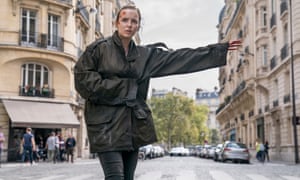
It wasn’t that Killing Eve was bad this year; I still looked forward to every second of Jodie Comer being lethal in couture. But as the second season progressed, some of what had been fun the first time around was lost in translation, and some of the pitfalls it had avoided in season one became gaping sinkholes. There was a bit of queer-baiting to answer for, with an abrupt about-turn on Eve’s part – at least when it came to her feelings for Villanelle. And to see the assassin repeatedly beaten up and cornered by bad men, even though she is one of the bad men herself, grew tiresome and a little sadistic. It had a lot to live up to after its debut, sure, but the absence of Phoebe Waller-Bridge’s writing this time was certainly felt. Rebecca Nicholson
Game of Thrones
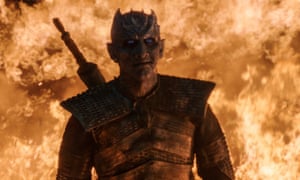
So Jon Snow is standing there, right, and the Night King is about to do him in. Seems fair. After all, Jon’s side is comprised of a few thousand humans of varying levels of military training and the Night King has ALL OF THE DEAD on his side. It’s a tragic way for our hero to go out, but after six years building up the be-horned bad guy, the outcome at least has a logic to it. There’d be nothing worse than some kind of deus ex infans at this point, would there. Sorry, what’s that? Oh.
Maybe it’s the regret at having spent so many hours following Game of Thrones through its eight seasons, all those characters, all that mud. Maybe I invested too much in a drama that was just dragons and shagging. Or, maybe, just maybe, a show that had raised the bar, which mixed the personal and the political, high fantasy and low life, and which had assiduously built tension over the course of years, botched its landing big style. Paul MacInnes
MotherFatherSon
I was stoked for BBC Two’s MotherFatherSon, not just because of the cast – Richard Gere, Sarah Lancashire, Helen McCrory – but because it was the work of Tom Rob Smith, writer of The Assassination of Gianni Versace and the masterful London Spy. But this was a glossy, empty mess, with multiple storylines all faltering over an eight-episode run that was at least two too long, and a political message about rising fascism and a media oligarchy that aimed for understated power but came off as lofty and pompous. Smith will be back with something visceral and authentic soon, no doubt. MotherFatherSon was sadly neither. Jack Seale
Criminal
Netflix’s Criminal had a great premise: what if you took the thrilling interview scenes from Line of Duty and made an entire show out of them? It had a solid cast, including David Tennant, Hayley Atwell and Deutschland 83’s Sylvester Groth, and the nifty idea of filming separate series set in the UK, France, Germany and Spain, to explore each country’s justice system. What a shame the execution was so off. This was less Line of Duty, more Law & Order: The International Edition, minus the flashes of knowing wit that made the latter so popular. Criminal was a series so po-faced, so in love with its own concept and the cast it had landed, that it forgot to bother with decent scripts or plots. Instead we got a series of would-be cat-and-mouse moments that were as interesting as watching paint dry. Sarah Hughes
The Mandalorian
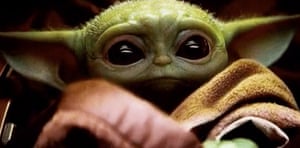
I dislike the word “simulcast” as much as the next person, but we are meant to be frolicking in a digital garden of Eden where any and all content can be freshly clicked (for a fee). Yet the staggered global rollout of the Disney+ streaming mega-service meant there has been no legal way for UK Star Wars fans to watch one of the most hyped new shows of 2019. What a slap to the helmet. How dare those Disney+ execs forbid us from watching Pedro Pascal’s bucket-headed bounty hunter saunter through a space western full of eccentric character actors! I’ve been forced to glean info about the first ever live-action Star Wars show the old-fashioned way: reading the proud tweets of guest stars and watching endless Baby Yoda memes. By the time Disney+ launches in the UK next year – in what those dumbos better be calling Imperial March 2020 – it will all be too late. Graeme Virtue
Years and Years
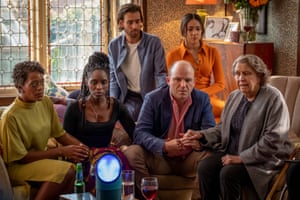
Boasting a cast that included Emma Thompson, Rory Kinnear, Russell Tovey and Jessica Hynes, Russell T Davies’s sweeping dystopian drama followed the fortunes of a family for 15 years, beginning in the immediate future. It started very well: the sheer terror in the household as air raid sirens resound following Donald Trump’s decision to launch a nuclear bomb rang terrifyingly true. Yet multiple implausibilities soon piled up, including a general election contested exclusively by Labour and the Conservatives, plus wildly inconsistent character arcs. By the end of the series, in which a dying character attempts to “upload” herself to the cloud, Years and Years had strayed from authentic speculation fiction into Doctor Who territory. David Stubbs
Modern Love
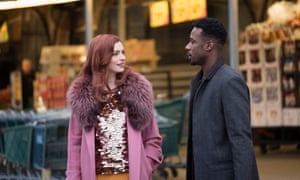
The talent thrown at Modern Love was incredible: Sharon Horgan; Tina Fey; Anne Hathaway; Dev Patel; Andrew Scott. It had pedigree, too, being based on the beloved New York Times column. But, god, it was hard to wash the smug off it. Modern Love just couldn’t adore itself any more. Watching the whole thing in one go was like drowning in fudge. Stuart Heritage
This Time With Alan Partridge
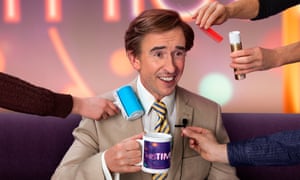
Alan Partridge is at his best when he’s in the doldrums – living in a Travel Tavern, binging on Toblerone, networking at a funeral. For almost three decades, we had watched Britain’s least in-demand broadcaster fall further and further from grace – until, that is, he landed an unexpected guest-hosting gig on This Time. Since when did glossy BBC magazine shows start recruiting from North Norfolk Digital? Not only did Alan’s appointment make frustratingly little sense, his freedom to interrupt the studied blandness of teatime TV with bombastic VTs failed to ring true. Nerdy rationality aside, something else was awry with Partridge 9.0 – namely, the fact that he was flying high. Despite his endless gaffes, he suddenly had status, and the hubris-fuelled nightmare that had hitherto been his career was abruptly ended. Of course, you cringed for him, but it turns out it’s hard to feel affection for a Partridge on the up. Thankfully, judging by the closing episode’s cliffhanger, Norwich’s finest seems to have blown his chance at the big time once again. Rachel Aroesti
The Good Place
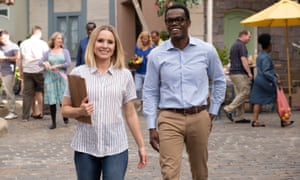
The Good Place started so promisingly: a comedy about life in an afterlife limbo for four unlikely pals – Eleanor the selfish partier, Chidi the morally-upstanding ethicist, Jason the wannabe DJ and British socialite Tahani – all held together by dapper Ted Danson starring as afterlife “architect” Michael. There were in-jokes aplenty (“forks” and frozen yoghurt) as well as goofy slapstick, heartbreak and genuine suspense. But its fourth and final season swiftly spiralled downwards into a marathon to tie up loose ends. The writing team swapped humour for the kinds of moralistic lessons you’d find on a “live, laugh, love” cushion, pushing the characters through stale scenarios propelled by well-worn jokes (Jason loving the Jacksonville Jaguars, Tahani name-dropping celebs, Eleanor loving a margarita). Watching The Good Place now feels like being in purgatory itself, waiting for the interminable torture to end. Ammar Kalia
The Crown
In the opening episode of series three, the nostalgia Olivia Colman’s Queen expressed for her former self felt depressingly appropriate. Wasting its distinguished new cast – especially Colman – The Crown became sluggish, humourless and painfully introverted in its latest run. Prince Philip feels sad about not going to the moon, so he flies really high in his private plane? Cry me a river. Prince Charles sulks that no one understands him: “Am I seen for who and what I am?” The Crown wasn’t all bad – the pedigree of its acting talent ensured this, and the Aberfan episode was endlessly moving. But, for the most part, it was sad to see such high-quality ingredients so boringly misused. David Alexander




















![[Book Review] The Blade Itself (The First Law Trilogy) by Joe Abercrombie](https://bendthekneegot.com/wp-content/uploads/2018/01/1516047103_maxresdefault-218x150.jpg)
















